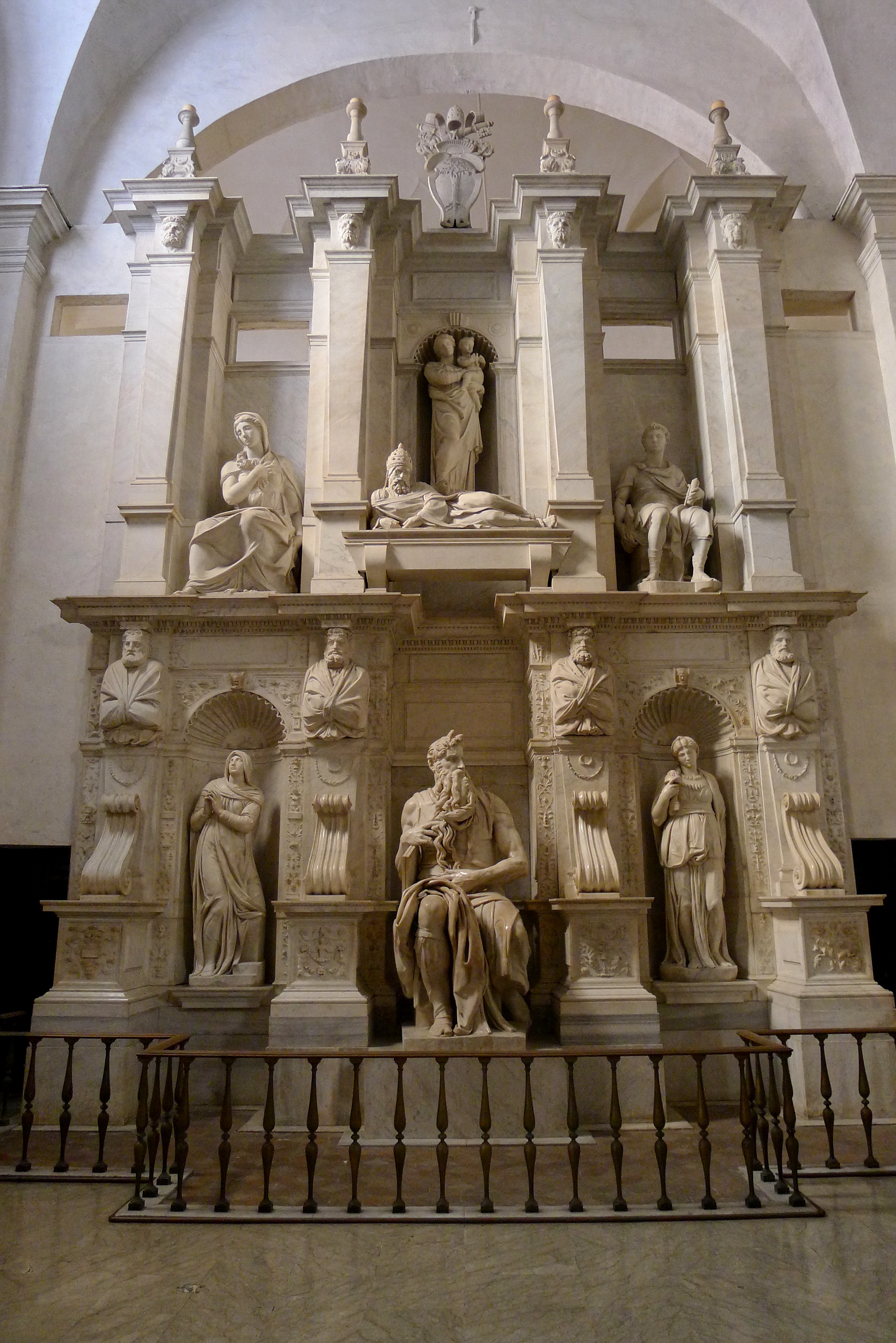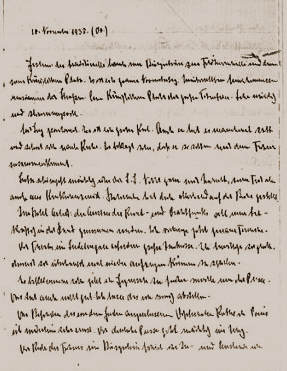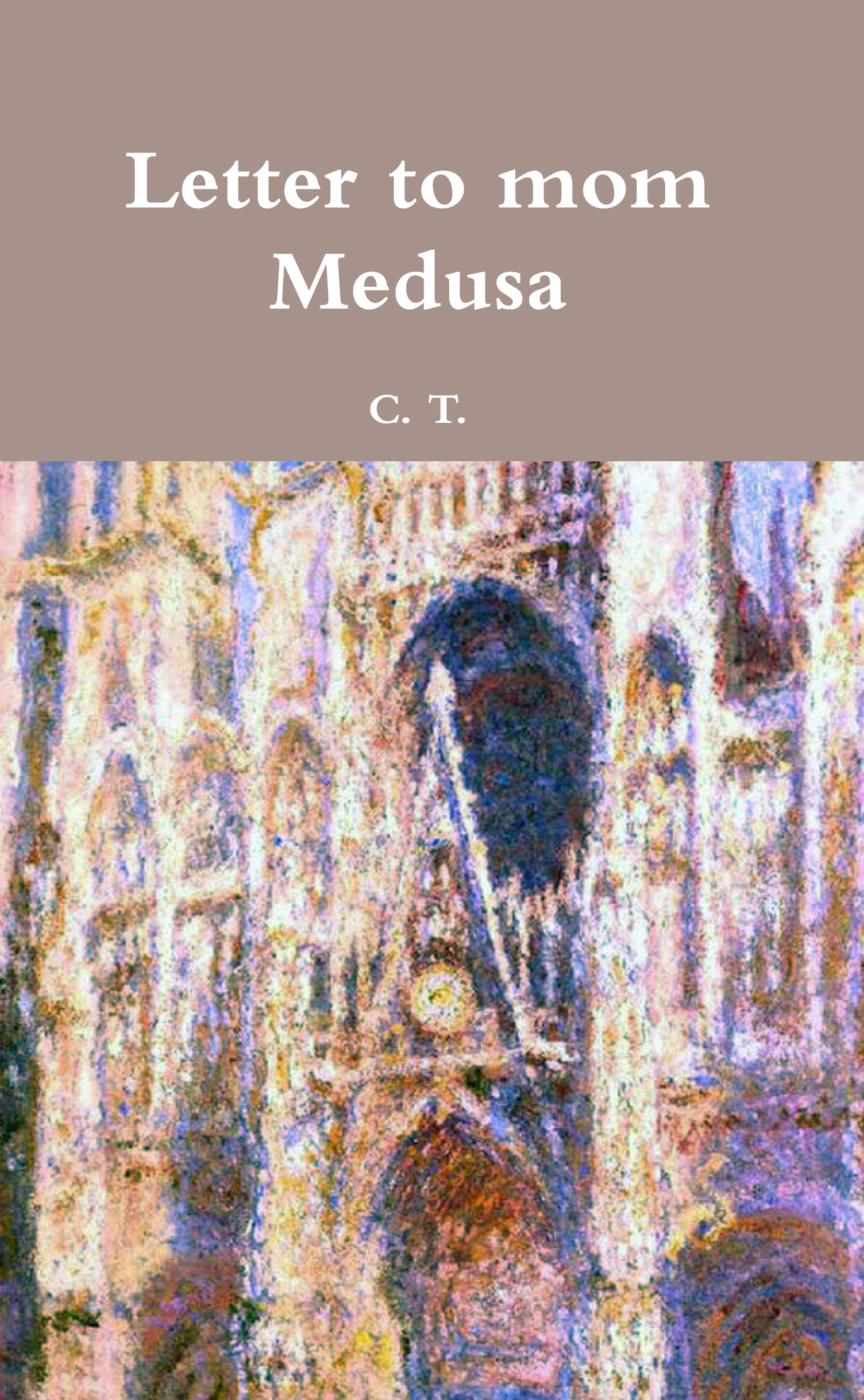
In the previous post today, I quoted a commenter who explained why the bulk of white nationalists in America don’t admire Hitler. His comment resulted in a sort of eureka moment for me as to solving another mystery: why these nationalists don’t have ‘pagan’ William Pierce’s Who We Are as their leading bestseller.
The sad answer is that these nationalists sold their souls to the devil: Judeo-Christianity, even those secular nationalists who refuse to place their parents’ religion on the bench of the accused.
It’s worth rephrasing what the Wikipedia article, ‘Religious aspects of Nazism’, says, purging from it of all anti-white crap that that damned online encyclopaedia promulgates, and adding some observations of my own:
Historians, political scientists and philosophers have studied National Socialism with a specific focus on its religious aspects.
Among the writers who alluded before 1980 to the religious aspects of National Socialism are Albert Camus, Romano Guardini, Denis de Rougemont, Eric Voegelin, Klaus Vondung and Friedrich Heer. Voegelin’s work on political religion was first published in German in 1938. The French author and philosopher Albert Camus made some remarks about National Socialism as a religion and about Adolf Hitler in particular in L’Homme révolté.
Outside a purely academic discourse, public interest mainly concerns the relationship between National Socialism and Occultism, and between National Socialism and Christianity. The persistent idea that the National Socialists were directed by occult agencies has been dismissed by historians as modern cryptohistory. The interest in the second relationship is obvious from the debate about Adolf Hitler’s religious views—specifically, whether he was a Christian or not.
National Socialism and occultism
There are many works that speculate about National Socialism and occultism, the most prominent being The Morning of the Magicians (1960) and The Spear of Destiny (1972). From the perspective of academic history, however, most of these works are ‘cryptohistory’. Academic historians did not consider the question until the 1980s. Due to the popular literature on the topic, National Socialist black magic was regarded as a topic for authors in pursuit of strong sales. In the 1980s, however, two Ph.D. theses were written about the topic. Nicholas Goodrick-Clarke published The Occult Roots of National Socialism (1985) based on his thesis, and the German librarian and historian Ulrich Hunger’s thesis on rune-lore in National Socialist Germany (Die Runenkunde im Dritten Reich) was published in the series Europäische Hochschulschriften.
Goodrick-Clarke’s book is not only considered without exception to be the pioneering work on Ariosophy, but also the definitive book on the topic. The term ‘Ariosophy’ refers to an esoteric movement in Germany and Austria of the 1900s to 1930s. It clearly falls under Goodrick-Clarke’s definition of occultism, as it obviously drew on the western esoteric tradition. Ideologically, it was remarkably similar to National Socialism. According to Goodrick-Clarke, the Ariosophists wove occult ideas into the völkisch ideology that existed in Germany and Austria at the time. Ariosophy shared the racial awareness of völkisch ideology, but also drew upon a notion of root races, postulating locations such as Atlantis, Thule and Hyperborea as the original homeland of the Aryan race (and its purest branch, the Teutons or Germanic peoples).
The Ariosophic writings described a glorious ancient Germanic past, in which an elitist priesthood ‘expounded occult-racist doctrines and ruled over a superior and racially pure society’. The downfall of this hypothesised golden age was explained as the result of the interbreeding between the master race and the untermenschen (lesser races). With the exception of Karl Maria Wiligut, Goodrick-Clarke has not found evidence that prominent Ariosophists directly influenced National Socialism.
But Goodrick-Clarke considers the National Socialist crusade as ‘essentially religious’. His follow-up book Black Sun: Aryan Cults, Esoteric National Socialism and the Politics of Identity examined ‘ariosophic’ ideas after 1945 and ‘neo-völkisch movements’.
National Socialism and Christianity
After National Socialist Germany had surrendered in World War II, the US Office of Strategic Services published a report on the National Socialist Master Plan of the Persecution of the Christian Churches. Historians and theologians generally agree about the National Socialist policy towards religion, that the objective was to remove explicitly Jewish content from the Bible (i.e., the Old Testament, the Gospel of Matthew, and the Pauline Epistles), transforming the Christian faith into a new religion, completely cleansed from any Jewish element and conciliate it with National Socialism, Völkisch ideology and Führerprinzip: a religion called ‘Positive Christianity’.
This, of course, was tried before, back in… 144 C.E.! Marcionism depicted the God of the Old Testament as a tyrant or demiurge. Marcion’s canon, the first Christian canon ever compiled, consisted of eleven books: a gospel, which was a form of the Gospel of Luke; and ten Pauline epistles. Marcion’s canon rejected the entire Old Testament, along with all other epistles and gospels. In my opinion, NS Positive Christians failed in this. It was a good try but ultimately it is impossible to combine water with oil. It is a very explainable mistake in the recent nation that had just awakened to the most elemental racialism.
Alfred Rosenberg was influential in the development of Positive Christianity. In The Myth of the Twentieth Century he wrote that:
- Saint Paul was responsible for the destruction of the racial values from Greek and Roman culture;
- the dogma of hell advanced in the Middle Ages destroyed the free Nordic spirit;
This is absolutely pivotal to understand white demoralisation (and it is a pity that our site is the only racialist site which has accused this doctrine of the havoc it caused among us)!
- original sin and grace are Oriental ideas that corrupt the purity and strength of Nordic blood;
- the Old Testament and the Jewish race are not an exception and one should return to the Nordic peoples’ fables and legends;
- Jesus was not Jewish, but had Nordic blood from his Amorite ancestors.
The latter point of course was another mistake. Neither Rosenberg nor Hitler or anyone at the top of the elites knew that Jesus didn’t even exist. Only recent scholarship has debunked the idea that Jesus, even an all-too human Jesus, existed (read, e.g., this book).
The National Socialist Party program of 1920 included a statement on religion as point 24. In this statement, the National Socialist party demands freedom of religion (for all religious denominations that are not opposed to the customs and moral sentiments of the Germanic race). Also, the paragraph proclaims the party’s endorsement of Positive Christianity. Historians have described this statement as ‘a tactical measure, cleverly left undefined in order to accommodate a broad range of meanings’, and an ‘ambiguous phraseology’.
This is a topic of some controversy. John S. Conway holds that The Holy Reich has broken new ground in the examination of the relation between National Socialism and Christianity, despite his view that ‘National Socialism and Christianity were incompatible’. The National Socialists were aided by theologians, such as Dr. Ernst Bergmann, who committed suicide after the Allied forces captured Leipzig. Bergmann, in his work, Die 25 Thesen der Deutschreligion (Twenty-five Points of the German Religion), expounded the theory that the Old Testament and portions of the New Testament of the Bible were inaccurate. He proposed that Jesus was of Aryan origin, and that Adolf Hitler was the new messiah.
Religious beliefs of leading National Socialists
Within a large movement like National Socialism, it may not be especially shocking to discover that individuals could embrace different ideological systems that would seem to be polar opposites. The religious beliefs of even the leading National Socialists diverged strongly.
The difficulty for historians lies in the task of evaluating not only the public, but also the private statements of the National Socialist politicians. Steigmann-Gall, who intended to do this in his study, points to such people as Erich Koch (who was not only Gauleiter of East Prussia and Reichskomissar for the Ukraine, but also the elected praeses of the East Prussian provincial synod of the Evangelical Church of the old-Prussian Union), and Bernhard Rust, as examples of National Socialist politicians who also professed to be Christian in private.
Adolf Hitler’s religious views
Adolf Hitler’s religious beliefs have been a matter of debate; the wide consensus of historians consider him to have been irreligious, anti-Christian and anti-clerical. In light of evidence such as his fierce criticism and vocal rejection of the tenets of Christianity, numerous private statements to confidants denouncing Christianity as a harmful superstition, and his strenuous efforts to reduce the influence and independence of Christianity in Germany after he came to power, Hitler’s major academic biographers conclude that he was irreligious and an opponent of Christianity.
Historian Laurence Rees found no evidence that ‘Hitler, in his personal life, ever expressed belief in the basic tenets of the Christian church’. Ernst Hanfstaengl, a friend from his early days in politics, says Hitler ‘was to all intents and purposes an atheist by the time I got to know him’. However, historians such as Richard Weikart and Alan Bullock doubt the assessment that he was a true atheist, suggesting that despite his dislike of Christianity he still clung to a form of spiritual belief.
Hitler was born to a practising Catholic mother, and was baptised into the Roman Catholic Church. From a young age, he expressed disbelief and hostility to Christianity. But in 1904, acquiescing to his mother’s wish, he was confirmed at the Roman Catholic Cathedral in Linz, Austria, where the family lived. According to John Willard Toland, witnesses indicate that Hitler’s confirmation sponsor had to ‘drag the words out of him almost as though the whole confirmation was repugnant to him’. Rissmann notes that, according to several witnesses who lived with Hitler in a men’s home in Vienna, Hitler never again attended Mass or received the sacraments after leaving home. Several eyewitnesses who lived with Hitler while he was in his late teens and early-to-mid 20s in Vienna state that he never attended church after leaving home at eighteen.
Nonetheless, in Hitler’s early political statements he attempted to express himself to the German public as a Christian. In his book Mein Kampf and in public speeches prior to and in the early years of his rule, he described himself as a Christian.
As we have seen, the National Socialist party promoted Positive Christianity, a movement which rejected most traditional Christian doctrines such as the divinity of Jesus, as well as Jewish elements such as the Old Testament. From this angle, contemporary Christian nationalists in the US are a century behind compared to Nazi Germany! Consider, for example, how the administrators of Occidental Dissent and The Daily Stormer still subscribe to traditional Christianity, not even to a sort of Positive Christianity (as Hitler said, America is Judaised and negrified to the core).
In one widely quoted remark, Hitler described Jesus as an ‘Aryan fighter’ who struggled against ‘the power and pretensions of the corrupt Pharisees’ and Jewish materialism. While a small minority of historians accept these publicly stated views as genuine expressions of his spirituality, the vast majority believe that Hitler was sceptical of religion and anti-Christian, but recognised that he could only be elected and preserve his political power if he feigned a commitment to and belief in Christianity, which the overwhelming majority of Germans believed in.
Privately, Hitler repeatedly deprecated Christianity, and told confidants that his reluctance to make public attacks on the Church was not a matter of principle, but a pragmatic political move. In his private diaries, Goebbels wrote in April 1941 that though Hitler was ‘a fierce opponent’ of the Vatican and Christianity, ‘he forbids me to leave the church. For tactical reasons’.
Hitler’s remarks to confidants, as described in the Goebbels Diaries, the memoirs of Albert Speer, and transcripts of Hitler’s private conversations recorded by Martin Bormann in Hitler’s Table Talk, are further evidence of his irreligious and anti-Christian beliefs; these sources record a number of private remarks in which Hitler ridicules Christian doctrine as absurd, contrary to scientific advancement, and socially destructive.
Once in office, Hitler and his regime sought to reduce the influence of Christianity on society. From the mid-1930s, his government was increasingly dominated by militant anti-church proponents like Goebbels, Bormann, Himmler, Rosenberg and Heydrich whom Hitler appointed to key posts. These anti-church radicals were generally permitted or encouraged to perpetrate the National Socialist persecutions of the churches. The regime launched an effort toward coordination of German Protestants under a unified Protestant Reich Church (but this was resisted by the Confessing Church), and moved early to eliminate political Catholicism. Hitler agreed to the Reich concordat with the Vatican, but then routinely ignored it, and permitted persecutions of the Catholic Church.
Jehovah’s Witnesses were ruthlessly persecuted for refusing both military service and allegiance to Hitler’s movement. Hitler said he anticipated a coming collapse of Christianity in the wake of scientific advances, and that National Socialism and religion could not co-exist long term. Although he was prepared to delay conflicts for political reasons, historians conclude that he ultimately intended the destruction of Christianity in Germany, or at least its distortion or subjugation to a National Socialist outlook.
Rudolf Hess
According to Goodrick-Clarke, Rudolf Hess had been a member of the Thule Society before attaining prominence in the National Socialist party. As Adolf Hitler’s official deputy, Hess had also been attracted to and influenced by the biodynamic agriculture of Rudolf Steiner and Anthroposophy. In the wake of his flight to Scotland, Reinhard Heydrich, the head of the security police, banned lodge organizations and esoteric groups on 9 June 1941.
The Thule Society took its name from Thule, an alleged lost land. Sebottendorff identified Ultima Thule as Iceland. In The Myth of the Twentieth Century, the most important National Socialist book after Mein Kampf, Alfred Rosenberg referred to Atlantis as a lost land or at least to an Aryan cultural center. Since Rosenberg had attended meetings of the Thule Society, he might have been familiar with the occult speculation about lost lands; however, according to Lutzhöft (1971), Rosenberg drew on the work of Herman Wirth. The attribution of the Urheimat of the Nordic race to a deluged land was very appealing at that time.
Heinrich Himmler
Reichsführer-SS Heinrich Himmler: ‘We believe in a God Almighty who stands above us; he has created the earth, the Fatherland, and the Volk, and he has sent us the Führer. Any human being who does not believe in God should be considered arrogant, megalomaniacal, and stupid and thus not suited for the SS’.
This of course was Himmler’s blunder, as theistic visions of the providence stem from monotheistic Judaism. Also, from my point of view, a personal god—i.e., the mythical Judeo-Christian god—should be written thus: (((God))).
On the other hand, credited retrospectively with being the founder of ‘Esoteric Hitlerism’, and certainly a figure of major importance for the officially sanctioned research and practice of mysticism by a National Socialist elite, Heinrich Himmler, more than any other high official in the Third Reich (including Hitler) was fascinated by pan-Aryan (i.e., broader than Germanic) racialism. Himmler’s capacity for rational planning was accompanied by an enthusiasm for the utopian, the romantic and even the occult. Although Himmler did not have any contact with the Thule Society, he possessed more occult tendencies than any other National Socialist leader. The German journalist and historian Heinz Höhne, an authority on the SS, explicitly describes Himmler’s views about reincarnation as occultism.
The historic example which Himmler used in practice as the model for the SS was the Society of Jesus, since Himmler found in the Jesuits what he perceived to be the core element of any order, the doctrine of obedience and the cult of the organisation. The evidence for this largely rests on a statement from Walter Schellenberg in his memoirs (Cologne, 1956, p. 39), but Hitler is also said to have called Himmler ‘my Ignatius of Loyola’. As an order, the SS needed a coherent doctrine that would set it apart. Himmler attempted to construct such an ideology, and to this purpose he deduced a Germanic tradition from history.
In a 1936 memorandum, Himmler set forth a list of approved holidays based on pagan and political precedents and meant to wean SS members from their reliance on Christian festivities. The Winter Solstice, or Yuletide, was the climax of the year. It brought SS folk together at candlelit banquet tables and around raging bonfires that harked back to German tribal rites.
The Allach Julleuchter (Yule light) was made as a presentation piece for SS officers to celebrate the winter solstice. It was later given to all SS members on the same occasion, December 21. Made of unglazed stoneware, the Julleuchter was decorated with early pagan Germanic symbols. Himmler said, ‘I would have every family of a married SS man to be in possession of a Julleuchter. Even the wife will, when she has left the myths of the church find something else which her heart and mind can embrace’.
Only adherents of theories of National Socialist occultism or the few former SS members who were, after the war, participants in the Landig Group in Vienna would claim that the cultic activities within the SS would amount to its own mystical religion. At the time of his death in 1986, Rudolf J. Mund was working on a book on the Germanic ‘original race-cult religion’. However, what was indoctrinated into the SS is not known in detail.
National Socialist archaeology
In 1935 Himmler, along with Richard Walther Darré, established the Ahnenerbe. At first independent, it became the ancestral heritage branch of the SS. Headed by Dr. Hermann Wirth, it was dedicated primarily to archaeological research, but it was also involved in proving the superiority of the ‘Aryan race’.
A great deal of time and resources were spent on researching or creating a popularly accepted historical, cultural and scientific background so the ideas about a superior Aryan race could be publicly accepted. For example, an expedition to Tibet was organised to search for the origins of the Aryan race. To this end, the expedition leader, Ernst Schäfer, had his anthropologist Bruno Beger make face masks and skull and nose measurements. Another expedition was sent to the Andes.
When I lived in Gran Canaria, an island off Africa, a Spanish woman told me that Himmler’s researchers had much interest in researching the Nordic aboriginals of the Canary islands: blonder and lighter than the Spaniards themselves.
Das Schwarze Korps
The official newspaper of SS was Das Schwarze Korps (‘The Black Corps’), published weekly from 1935 to 1945. In its first issue, the newspaper published an article on the origins of the Nordic race, hypothesising a location near the North Pole similar to the theory of Hermann Wirth (but not mentioning Atlantis).
Also in 1935, the SS journal commissioned a Professor of Germanic History, Heinar Schilling, to prepare a series of articles on ancient Germanic life. As a result, a book containing these articles and entitled Germanisches Leben was published by Koehler & Amelung of Leipzig with the approval of the SS and Reich Government in 1937. Three chapters dealt with the religion of the German people over three periods: Nature worship and the cult of the ancestors, the sun religion of the Late Bronze Age, and the cult of the gods.
According to Heinar Schilling, the Germanic peoples of the Late Bronze Age had adopted a four-spoke wheel as symbolic of the sun ‘and this symbol has been developed into the modern swastika of our own society [NS Germany] which represents the sun’. Under the sign of the swastika ‘the light bringers of the Nordic race overran the lands of the dark inferior races, and it was no coincidence that the most powerful expression of the Nordic world was found in the sign of the swastika’.
Very little had been preserved of the ancient rites, Professor Schilling continued, but it was a striking fact ‘that in many German Gaue today on Sonnenwendtage (solstice days) burning sun wheels are rolled from mountain tops down into the valleys below, and almost everywhere the Sonnenwendfeuer (solstice fires) burn on those days’. He concluded by saying that ‘The Sun is the All-Highest to the Children of the Earth’.
SS-Castle Wewelsburg
Himmler has been claimed to have considered himself the spiritual successor or even reincarnation of Heinrich the Fowler, having established special SS rituals for the old king and having returned his bones to the crypt at Quedlinburg Cathedral. Himmler even had his personal quarters at Wewelsburg castle decorated in commemoration of Heinrich the Fowler. The way the SS redesigned the castle referred to certain characters in the Grail-mythos (cf. what I’ve said on this site about Wagner’s Parsifal).
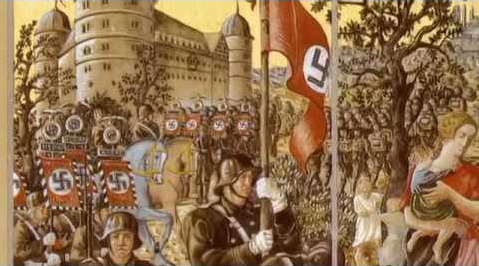 Himmler had visited the Wewelsburg on 3 November 1933 and April 1934; the SS took official possession of it in August 1934. The occultist Karl Maria Wiligut (known in the SS under the pseudonym ‘Weisthor’) accompanied Himmler on his visits to the castle. Initially, the Wewelsburg was intended to be a museum and officer’s college for ideological education within the SS, but it was subsequently placed under the direct control of the office of the Reichsführer SS (Himmler) in February 1935. The impetus for the change of the conception most likely came from Wiligut.
Himmler had visited the Wewelsburg on 3 November 1933 and April 1934; the SS took official possession of it in August 1934. The occultist Karl Maria Wiligut (known in the SS under the pseudonym ‘Weisthor’) accompanied Himmler on his visits to the castle. Initially, the Wewelsburg was intended to be a museum and officer’s college for ideological education within the SS, but it was subsequently placed under the direct control of the office of the Reichsführer SS (Himmler) in February 1935. The impetus for the change of the conception most likely came from Wiligut.
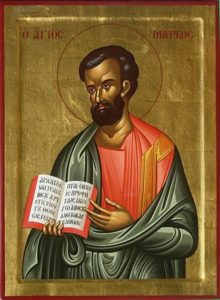 (Note of the Ed.: Left, representation of Mark the Evangelist.) Thus it was that Paul’s surviving followers—perhaps Mark, Luke, Peter, John, and Matthew—decided to pick up the game. This band of “little ultra-Jews”[1] needed a more detailed story of Jesus’ life; Paul’s vague allusions to a real man would no longer suffice. Someone—“Mark”—thus decided to quote Jesus extensively and directly. Unlike Paul’s letters, this “gospel” (Paul’s word) would be intended for mass consumption. It had to be impressive—lots of miracles from their miracle-man. It would end up with 19 Jesus miracles wedged into the smallest of the four Gospels. And there were several other firsts. Here we read, for the first time ever, about the 12 apostles, Jesus as a carpenter, and the concept of hell. Here too Jesus makes a clever “prophecy” that the Jewish temple would be ruined (13:1-2)—an easy call to make, given that the temple was just actually destroyed!
(Note of the Ed.: Left, representation of Mark the Evangelist.) Thus it was that Paul’s surviving followers—perhaps Mark, Luke, Peter, John, and Matthew—decided to pick up the game. This band of “little ultra-Jews”[1] needed a more detailed story of Jesus’ life; Paul’s vague allusions to a real man would no longer suffice. Someone—“Mark”—thus decided to quote Jesus extensively and directly. Unlike Paul’s letters, this “gospel” (Paul’s word) would be intended for mass consumption. It had to be impressive—lots of miracles from their miracle-man. It would end up with 19 Jesus miracles wedged into the smallest of the four Gospels. And there were several other firsts. Here we read, for the first time ever, about the 12 apostles, Jesus as a carpenter, and the concept of hell. Here too Jesus makes a clever “prophecy” that the Jewish temple would be ruined (13:1-2)—an easy call to make, given that the temple was just actually destroyed!